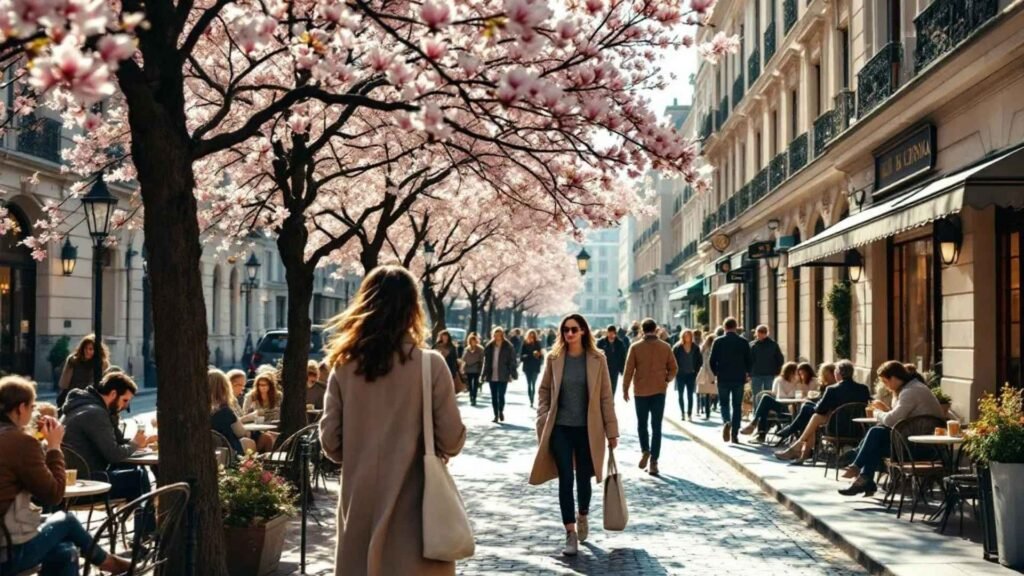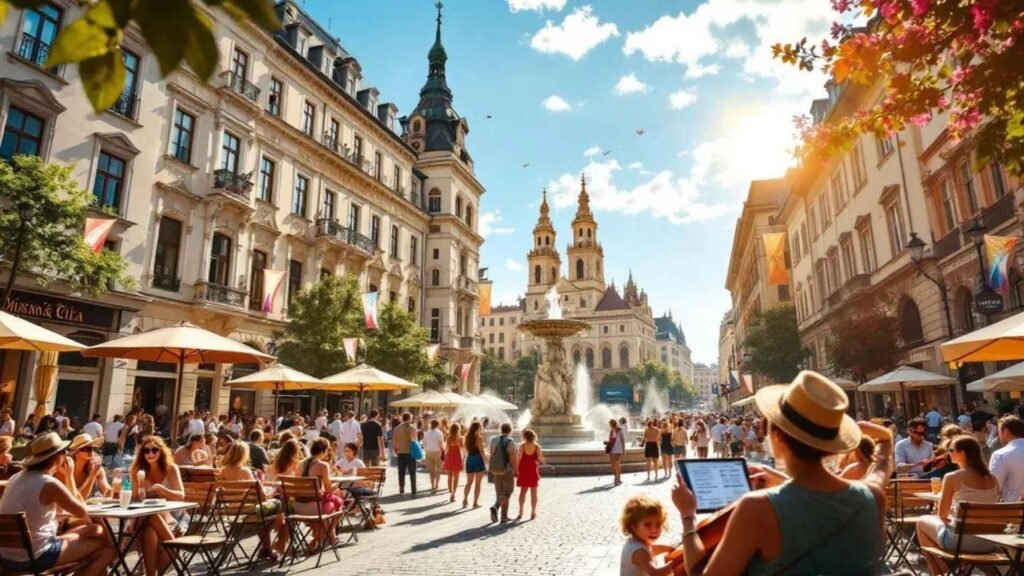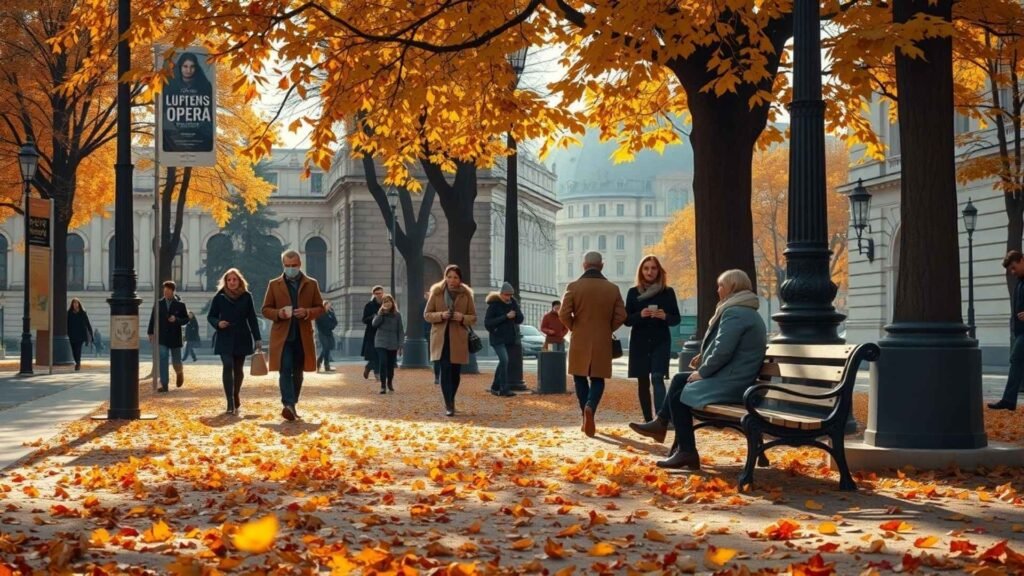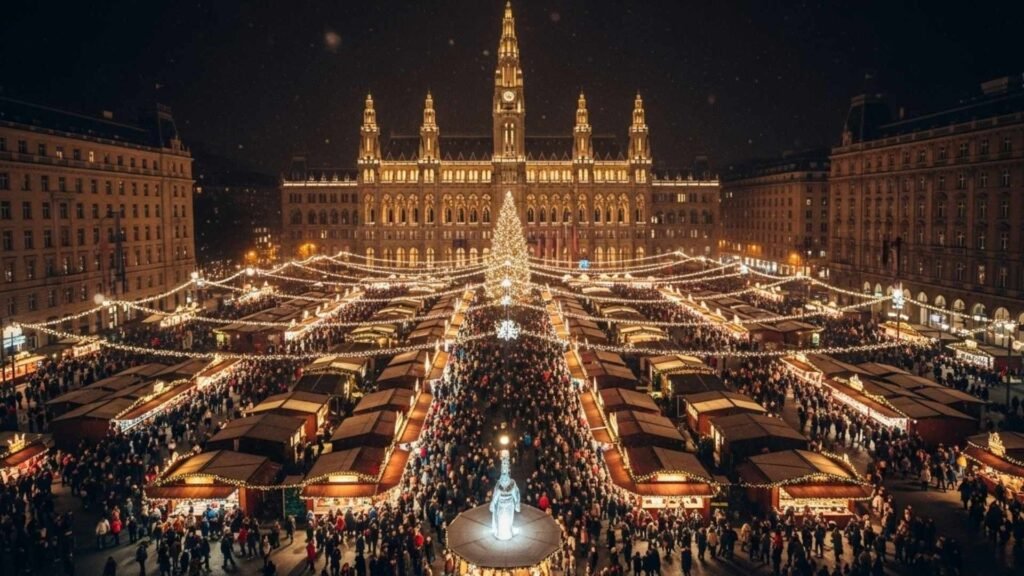Vienna, Austria’s elegant and historic capital, is famous for its imperial palaces, world-class museums, classical music traditions, and coffee culture. The city offers a different charm in every season, and the time you choose to visit can shape your entire experience.
In winter, Vienna glows with romantic Christmas markets and festive lights. Spring brings fresh air and blooming gardens. Summer is lively with open-air concerts and festivals, while autumn paints the city’s parks in golden and red tones. Each season has its own beauty, atmosphere, and activities to enjoy.
This blog post explores Vienna throughout the year, with travel tips and highlights for every season. You’ll find the best events, activities, and weather expectations for each period, helping you decide the perfect time for your Vienna trip.
Spring (March – May): Vienna in Bloom with Mild Weather

Spring is when Vienna awakens from its winter slumber. Parks and gardens bloom with vibrant colors, and the mild weather makes it ideal for walking, sightseeing, and enjoying outdoor cafés. Compared to summer, the city is less crowded, offering a more relaxed and authentic experience.
Weather Conditions
- March: Still cool (4–10°C / 39–50°F). Mornings and evenings are chilly; bring layers and a light coat. Occasional rain showers possible.
- April: Milder (8–15°C / 46–59°F) with more sunshine, though brief cool spells and sudden rain may occur.
- May: Pleasant and sunny (12–20°C / 54–68°F). Warm enough for T-shirts during the day, but a light jacket is useful in the evenings.
Key Activities
- Schönbrunn Palace Gardens: Bursting with tulips, daffodils, and spring blooms—perfect for long strolls and views from the Gloriette.
- Prater Park: Ride the Wiener Riesenrad Ferris wheel and enjoy the greenery and lively amusement park atmosphere.
- Donau-Auen National Park: Ideal for nature walks and birdwatching, with spring marking the return of migratory birds.
- Vienna Spring Festival (Wiener Frühlingsfestival): Concerts, exhibitions, and cultural events from March to May.
- Outdoor Coffee Culture: Sit at the Schanigarten (outdoor cafés) with a Viennese coffee and classic desserts like Apfelstrudel or Sachertorte.
Advantages
- Mild weather and colorful landscapes
- Fewer tourists than in summer
- Lower hotel prices (except during Easter)
- Photogenic city views and blooming gardens
Disadvantages
- Weather can be unpredictable (rain, cool spells)
Tips
- Bring an umbrella and a light waterproof jacket.
- Book hotels and flights early if visiting around Easter, as the city gets busier and prices rise.
Summer (June – August): Festivals, Events, and Long Days in Vienna

Vienna in summer is lively and energetic. The city comes alive with music festivals, open-air events, and long daylight hours. Cafés, restaurants, and attractions are full, creating a festive and social atmosphere perfect for outdoor activities.
Weather Conditions
- June: Pleasant and sunny (16–24°C / 61–75°F), with occasional refreshing showers.
- July – August: The hottest months (18–28°C / 64–82°F). Temperatures can exceed 30°C / 86°F during heatwaves, often humid, but evenings are cooler and enjoyable.
Key Activities
- Music Film Festival (Rathausplatz): Free outdoor screenings of opera, ballet, and classical concerts with international food stalls.
- Danube Island Festival (Donauinselfest): One of Europe’s biggest free music festivals with concerts, DJs, and entertainment at the end of June.
- Schönbrunn Summer Night Concert: Vienna Philharmonic’s free open-air performance in the Baroque gardens of Schönbrunn Palace.
- Hofburg Palace & Museums: Air-conditioned museums like the Sisi Museum or Kunsthistorisches Museum—ideal for hot days.
- Danube Canal (Donaukanal): Trendy beach bars, cafés, and riverside venues with live music and sunset views.
- Swimming & Lakeside Beaches: Cool off at the Neue Donau or Old Danube, or try canoeing, rowing, and water sports.
Advantages
- Long sunny days
- Plenty of festivals and outdoor activities
- Vibrant city atmosphere
Disadvantages
- High heat and humidity
- Crowded attractions
- Expensive hotels and flights
Tips
- Wear light clothing, a hat, and sunscreen, and drink plenty of water.
- Book tickets for attractions and concerts online in advance.
- Use insect repellent for evenings near the Danube and green areas.
Autumn (September – November): Golden Vienna and Cultural Delights

Autumn is one of Vienna’s most enchanting seasons. Parks and streets glow in golden, red, and orange tones, while the air becomes crisp and refreshing. With fewer tourists than in summer, the city shifts toward cultural depth, as opera, concerts, and theater seasons reach full swing.
Weather Conditions
- September: Mild and sunny (12–19°C / 54–66°F), with summer warmth lingering.
- October: Cooler, true autumn weather (7–14°C / 45–57°F), leaves turning golden.
- November: Colder and rainier (3–8°C / 37–46°F), sometimes windy; chance of snow late in the month.
Key Activities
- Autumn Walks & Photography: Schönbrunn Gardens, Stadtpark, Volksgarten, and Burggarten offer stunning fall colors with historic backdrops.
- Vienna Marathon (October): International sporting event energizing the city.
- Vienna Design Week: Exhibitions and workshops across the city.
- Opera & Concert Season: October marks the start of world-class performances at the State Opera, Musikverein, and Konzerthaus. Book early!
- New Wine Festivals (Heuriger): Enjoy fresh wine and local food in Grinzing or Nussdorf’s traditional taverns.
- Museum Visits: Perfect time to explore museums like Kunsthistorisches, Albertina, Belvedere, and Leopold without summer crowds.
Advantages
- Stunning autumn colors and photo opportunities
- Fewer crowds and lower hotel prices (except September)
- Rich cultural season with concerts and festivals
Disadvantages
- November can be rainy, cold, and with shorter daylight
Tips
- Wear layers and waterproof shoes; carry an umbrella.
- Reserve tickets for concerts and opera weeks in advance, as popular shows sell out quickly.
Winter (December – February): Vienna’s Christmas Spirit and Winter Delights

In winter, Vienna turns into a fairytale city. December is especially magical with Christmas markets, sparkling lights, mulled wine, and gingerbread aromas. New Year’s concerts and elegant balls add romance and celebration. January and February are quieter but charming with snow-covered scenery.
Weather Conditions
- December: Cold (0–5°C), sometimes snowy, ideal for Christmas markets.
- January – February: Coldest months (-3 to 2°C), frequent snow, picturesque winter landscapes.
Key Activities
- Christmas Markets: At Rathausplatz, Schönbrunn, Belvedere, Karlsplatz—enjoy mulled wine, roasted chestnuts, gingerbread, and handmade gifts.
- New Year’s Eve & Concerts: Highlights include the Vienna Philharmonic’s New Year’s Concert and the Imperial Ball at Hofburg (tickets sell out early).
- Ice Skating: Popular at Rathausplatz (Wiener Eistraum) and smaller rinks under evening lights.
- Museums: Warm indoor visits to Kunsthistorisches, Albertina, Leopold, and Hofburg Palace.
- Coffee Houses: Relax at Café Central, Café Sacher, or Demel with coffee and traditional pastries.
- Prater Winter Festival: Winter-themed rides, stalls, and entertainment.
Advantages
- Magical Christmas and New Year atmosphere
- Snowy, romantic cityscapes
- Fewer tourists after early January
Disadvantages
- Very cold weather, short daylight
- High prices and big crowds in December
Tips
- Dress in warm layers with waterproof boots, scarf, hat, and gloves.
- Book tickets for concerts and events (especially New Year’s Concert) months in advance.
General Recommendations for Planning Your Vienna Trip Optimally:
Public Transportation
Vienna has an excellent metro (U-Bahn), tram, and bus system. It’s easy to get around with daily, 24/48/72-hour, or weekly Wiener Linien tickets.
Vienna Pass / City Card
If you plan to visit many museums and attractions, consider these cards. The Vienna Pass includes museum entries and Hop-on Hop-off buses, while the City Card offers public transport and discounts. Choose based on your itinerary.
Accommodation
During peak seasons (summer, Christmas, New Year), book hotels or apartments early—prices rise and availability is limited.
Tickets & Reservations
For popular sites like Schönbrunn Palace or events such as operas and concerts (especially the New Year’s Concert), buy tickets online in advance to avoid long lines and sold-out dates.
Walking Shoes
Vienna is best explored on foot—bring comfortable, supportive shoes.
Food & Coffee Culture
Try local specialties like Wiener Schnitzel, Tafelspitz, Apfelstrudel, Sachertorte, and Gugelhupf. Don’t miss the UNESCO-listed Viennese coffeehouse culture—spend time in iconic cafés like Café Central, Demel, or Sacher.
Language
German is the official language, but English is widely spoken in tourist areas.
Currency
Austria uses the Euro (€). Cards are accepted almost everywhere, but carry some cash for small vendors and Christmas markets.
Conclusion: Vienna Awaits You, Four Seasons a Year – To Create Unforgettable Memories
Vienna offers a different beauty in every season, providing unique experiences to its visitors. Whether you find peace in the fragrant gardens of spring, participate in the lively festivals of summer, explore cultural depth amidst the golden landscapes of autumn, or immerse yourself in the fairytale Christmas atmosphere of winter, Vienna will always embrace you and hold a special place in your heart. By considering our seasonal recommendations and choosing the time that best suits your interests and preferences, you can transform your Vienna trip into an unforgettable adventure. Remember, in Vienna, there’s a new beauty to discover and a new experience to live around every corner!

